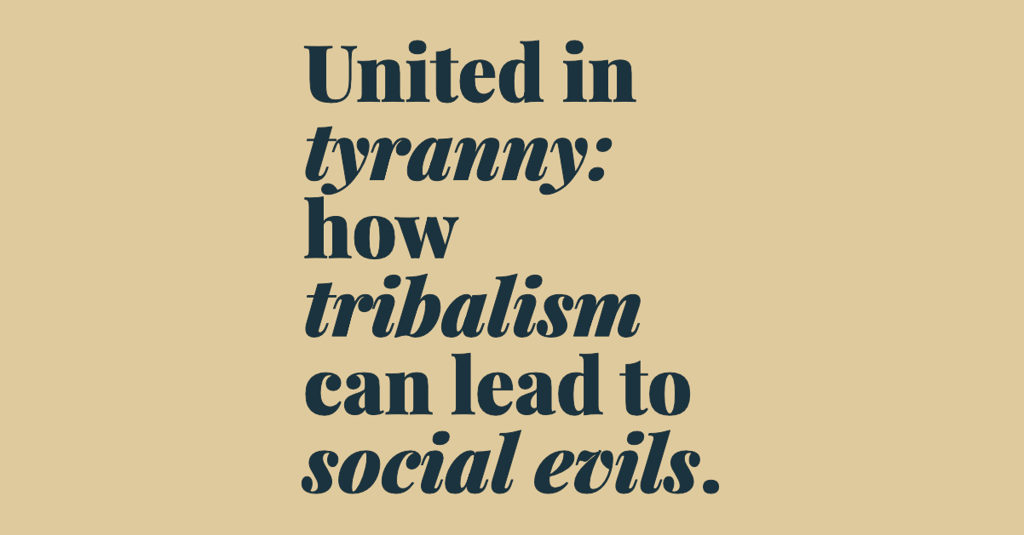United in tyranny: how tribalism can lead to social evils
Imam Mohammad Aasim Mirza
7/16/20193 min read


The term ʿaṣabiyyah originates from the root ʿayn-saad-baa and carries several intriguing definitions. For instance, the phrase ʿaṣban al-shayʾan means ‘to fold something’ while ʿaṣban al-nāqata refers to ‘tying the legs of a camel together during milking’. Similarly, taʿaṣṣaba translates to ‘to bandage’, and ʾitaṣab al-qawm means ‘to become a group’. Other interpretations include al-taʿaṣṣub, which signifies ‘denying the truth even when presented with evidence’, and al-ʿaṣabiyy, meaning ‘to support tyranny out of loyalty to kinship’.
According to Ibn Khaldūn (d. 1406), ʿaṣabiyyah is characterised by group consciousness, cohesiveness among kin or non-kin, and a sense of unity. It is not inherently tied to nomadism, nor does it necessitate that members of a group be blood relatives. Social groups can form when diverse individuals rally around a shared cause, belief, or religion. In the context of this discussion, a comparable term for ʿaṣabiyyah is ‘tribalism’, defined as ‘the behaviours and attitudes stemming from strong loyalty to one's own tribe or social group’.
So, is ʿaṣabiyyah inherently good or bad? Setting aside discussions of nationhood, nationalism, and nationality—concepts rooted in the Westphalian construct, which introduced secularism and laid the foundation for the European nation-state system in the 19th century—we turn instead to the teachings of the blessed Prophet صلى الله عليه وآله وسلم . While loyalty to family, kinship, and community is a deeply valued principle in Islam, this loyalty must never come at the expense of truth or justice. Islam emphatically rejects the idea of supporting falsehood or oppressive behaviour solely out of allegiance to one’s people. Regarding this, the blessed Prophet صلى الله عليه وآله وسلم is reported to have said:
وَمَنْ قَاتَلَ تَحْتَ رَايَةٍ عُمِّيَّةٍ يَغْضَبُ لِعَصَبَةٍ أَوْ يَدْعُو إِلَى عَصَبَةٍ أَوْ يَنْصُرُ عَصَبَةً فَقُتِلَ فَقِتْلَةٌ جَاهِلِيَّةٌ
“If one who fights under the banner of a people who are blind; who gets flared up with family pride; calls [people] to fight for their family honour; and supports his kith and kin is killed, he dies as one belonging to the days of ignorance.” — Muslim #18481
This ḥadīth is part of a longer narration and follows a section stating that anyone who abandons the main body of Muslims and dies in such a state will be as if they have died in the days of ignorance. In other words, this person’s death is likened to that of a non-Muslim—underscoring the gravity of this matter. Similarly, if someone sides with their family or social group solely on the basis of their connection, disregarding the facts of a particular issue, and were to die in such a state, it would be as if they had died in the days of ignorance—without embracing Islam, having practised something reprehensible. This is because Islam does not condone blind allegiance; rather, it emphasises the importance of seeking and upholding what is truthful, just, and fair.
In the context of blindly supporting tyrannical behaviour, the blessed Prophet صلى الله عليه وآله وسلم is narrated to have said:
مَنْ أَعَانَ قَوْمَهُ عَلَى ظُلْمٍ فَهُوَ كَالْبَعِيرِ الْمُتَرَدِّي يَنْزِعُ بِذَنَبِهِ
“Whoever supports his people in oppression is like a dead camel that falls into a well and is pulled out by its tail.” — Musnad Imām Aḥmad #4292
This ḥadīth very aptly conveys the futility and disgrace of blindly supporting one’s tribe or group in acts of oppression. Such behaviour not only disgraces the individual but also undermines the moral foundation of their loyalty. It is quite clear that allegiance to one’s people should be grounded in righteousness and acts of goodness, not in enabling or perpetuating wrongdoing.
Islam teaches us to strike a balance between upholding familial and communal ties and standing firm against injustice. True loyalty lies in encouraging what is right and just, even when it means correcting or challenging our own people. Blindly siding with one’s kin out of ignorance or tribal allegiance is a practice that the blessed Prophet صلى الله عليه وآله وسلم warned us against.
Let this serve as a reminder to reflect on the nature of our loyalties. May we always strive to be steadfast in truth, stand against oppression, and embody the principles of justice that Islam so beautifully upholds. In doing so, we not only honour our relationships but also remain aligned with the values that lead to Allah’s عزوجل pleasure.
And Allah عزوجل and His Messenger صلى الله عليه وآله وسلم know best.
